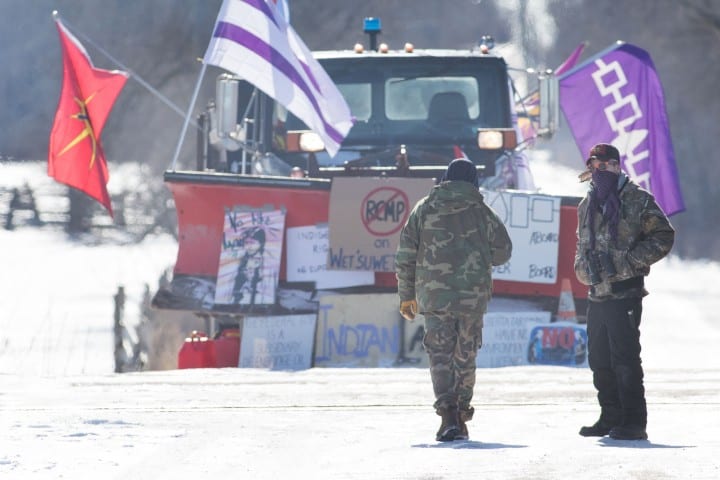Bolder actions, words from protesters behind Quebec and Ontario rail blockades
Published February 26, 2020 at 11:53 pm

Protesters behind rail blockades in Quebec and Ontario ramped up their actions and rhetoric Wednesday as government officials accused them of compromising public safety.
Demonstrators in Tyendinaga Mohawk Territory near Belleville, Ont., were seen on video standing on rail tracks as a CN Rail train approached Wednesday, then jumping out of the way at the last second.
Provincial police said a handful of protesters also lit fires near and on railway tracks at a secondary camp that remained in place after a raid on another, larger blockade earlier this week.
The latest disruptions were denounced by Prime Minister Justin Trudeau and Public Safety Minister Bill Blair, who called the protesters’ actions unsafe.
“It is extremely concerning to see people endangering their own lives and the lives of others by trying to interfere with the trains,” Trudeau told reporters.
Meanwhile, Quebec Premier Francois Legault suggested provincial police had not moved in to dismantle a blockade on the Kahnawake Mohawk territory south of Montreal because those on the reserve are armed, potentially with assault rifles.
His comments came as protesters on the Mohawk territory south of Montreal used concrete barriers and rocks to reinforce a blockade that has been in place since Feb. 8.
The secretary of the Mohawk Nation at Kahnawake, Kenneth Deer, said in a statement that any police efforts to forcibly remove the site would be seen as an “act of provocation and aggression that will exacerbate an already volatile situation.”
The rail company obtained an injunction on Tuesday to end the blockade, one of several such protests in support of Wet’suwet’en hereditary chiefs who oppose a natural gas pipeline cutting across their traditional territory.
But Deer said protesters have no intention of leaving and need to be prepared for a possible intervention by outside police. “Ultimately, coercive state-sponsored force is the wrong way to make peace,” Deer said.
Rail and road disruptions have continued in recent days after several high-profile blockades were dismantled by police in B.C. and Ontario earlier this week.
The agency responsible for a major commuter rail service covering much of southern Ontario said Wednesday it was not anticipating any of the delays and cancellations that brought trains to a standstill during the previous day’s rush hour.
Metrolinx, operator of the GO Transit network, suspended service Tuesday on multiple routes as a series of protests sprang up in and around Toronto.
City police said they arrested three people at the demonstrations. They said Wednesday morning that officers provided protesters with an injunction and began moving them from rail tracks.
The blockade had threatened to delay morning commutes west of the city, but police said the rail line has been cleared and most commuter rail lines were running on time or with minor delays.
Demonstrators also set up new sites in Ontario and Quebec this week, though some dispersed or were dismantled in less than a day.
A protest at a GO station in Hamilton caused numerous cancellations and delays starting Monday evening, but local police said protesters left the blockade site in the city peacefully at around 5 p.m. Tuesday.
Other new disruptions that surfaced Tuesday included a blockade along a highway near the site of an ongoing land dispute in Caledonia, Ont., and one along a stretch of rail in Sherbrooke, Que., about 150 kilometres east of Montreal.
Police moved in to end the Sherbrooke blockade on Tuesday afternoon, arresting protesters who had blocked a rail line in the city’s Lennoxville district. The protest along Highway 6 in Ontario remains active.
The hereditary chiefs of the Wet’suwet’en Nation, whose opposition to the Coastal GasLink project has spurred the widespread protests and disruptions, were meeting in British Columbia on Wednesday. Federal officials said they were waiting to hear whether the hereditary chiefs would invite them and their provincial counterparts to discuss the issue.
One of the hereditary chiefs, Na’moks, who also goes by John Ridsdale, suggested progress was being made in reaching the conditions they have set for such a meeting to take place.
-With files from Liam Casey in Toronto and Teresa Wright in Ottawa
Morgan Lowrie and Paola Loriggio, The Canadian Press
insauga's Editorial Standards and Policies advertising





